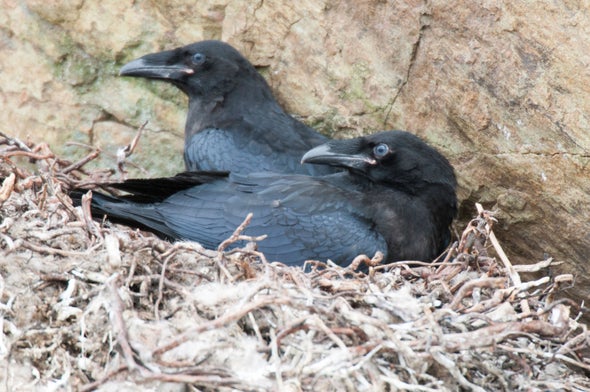Juvenile ravens performed just as well as chimps and orangutans in a battery of intelligence tests—except for assays of spatial skills. Christopher Intagliata reports.

Ravens are known for their exceptional intelligence—in fact, they’re sometimes called “flying primates.”
“We knew they are very smart, but nobody had really tested this using a big and comprehensive test battery, which also then really enabled us to say, ‘Is their cognitive performance similar to those of great apes or not?’”
Simone Pika is a cognitive scientist at the University of Osnabrück in Germany. She and her colleagues wanted to see how ravens would measure up to primates across a wide array of tasks, so they subjected eight ravens to something called the Primate Cognition Test Battery—a series of 33 different tasks designed to assess various aspects of intelligence among primates.
For example, one test is a game of cups you might have seen at a fair—put an object under one of three cups, move the cups around and guess which cup the object is under. Other tasks tested the ravens’ ability to determine cause and effect or to understand different quantities. Peanuts were a popular test item to keep the birds motivated.
Overall the researchers found that four-month-old ravens, which you might think of as “teenage” ravens, did just as well on most tasks as adult chimps and orangutans—except on tests of spatial skills.
“And that was a little surprising to us. But we used a test battery that was designed to test primate cognition. And these are tasks which may make sense for human children and great apes. And now we use this for a species which is very different. They are flying; they have beaks, communicate with beaks, don’t have hands. So I would say here maybe the task we used to test their spatial skills could be improved.”
The results appear in the journal Scientific Reports. [Simone Pika et al., Ravens parallel great apes in physical and social cognitive skills]
Kaeli Swift is a behavioral ecologist who studies crows and other corvids at the University of Washington. She says she was impressed by the results—and how comprehensive the tests were—but says it can be hard to assess intelligence by comparing across species.
“I’d like to see a shift in our language from comparing ravens to primates, like calling them flying primates, to rethinking how we scale animals—and not putting them on such a linear scale, right, where we’re like, ‘Wow, birds are as smart as apes. That’s amazing. Who would have thought?’ It’s like, well, there’s a bunch of really smart animals, and their natural history informs a lot of their physical and social cognition. And it’s much less linear than the narrative we often tell.”
Animal intelligence, she says, is much more complex and variable than we think.
—Christopher Intagliata
[The above text is a transcript of this podcast.]

